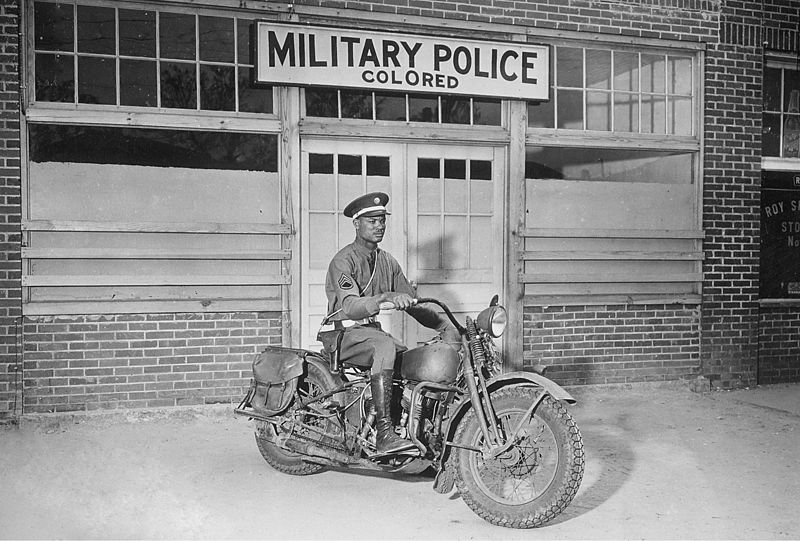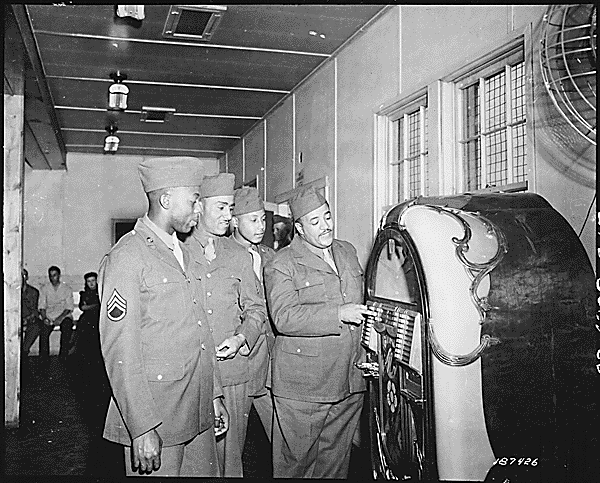
World War II
In this same era, World War II (1939-1945) was the catalyst for enormous sociological changes in North American society, with important repercussions in radio programming. In support of the war effort, Black men, together with women of all ethnic backgrounds, occupied positions in the workforce formerly reserved for White males. Greater economic power and status came along with more work opportunities. Although most of these jobs reverted into the hands of White men in the immediate post-war period, the American psyche had changed permanently. Neither Black people nor women were any longer content with what had for too long been the status quo.
The allure of these "new" job opportunities motivated many Americans, Black and White, to move from the country to the quickly developing industrial cities in the North and on the East and West Coasts. This migration was especially pronounced among the Black populace and continued after the end of World War II in 1945. The statistics are telling. Between 1940 and 1950, over one and a half million African Americans migrated from the South. Around 400,000 Black Americans moved to Los Angeles alone, creating the vital and vibrant community known as Watts. The new economic opportunities in most major cities meant that Blacks' average income increased substantially starting in the early 1940s. New social conditions gave rise to new social attitudes, which created unique needs that the music industry sought to satisfy by, among other things, developing the Black popular music style called rhythm and blues that emerged in this period. Of course, people spent extra income on leisure items, including the consumption of rhythm and blues music through the purchase of records and the patronage of jukeboxes that stocked the records.
In many of these urban centers, independent record companiesA small to mid-sized record company that is not backed by a major record label, often started by and geared toward a specific music genre. such as Chess in Chicago, King in Cincinnati, Specialty and Imperial in Los Angeles, and Atlantic in New York City began operating soon after the war ended, recording the new music to serve the needs of a newly urbanized population. The magnetic tape recorder, developed at the end of World War II, significantly aided the rise of independent record companies by lowering the cost of making records, which allowed more prospective entrepreneurs to enter the record business. Equally important was the electric jukebox's growth-by 1939, there were approximately 300,000 of them in use. Collectively, jukebox operators bought roughly 60 percent of all records manufactured. Furthermore, audiences at the lower end of the economic scale were less likely to purchase phonograph players or records in significant numbers. Instead, they would consume music by putting nickels into jukeboxes at local juke joints and restaurants. To satisfy this trend, jukebox operators bought upwards of 80 percent of all rhythm & blues records manufactured by independent record labels in the 1940s.
Big Mama Thornton's "Hound Dog"
The lyrics are metaphorically about a "man," Although she refers to him as a hound dog, with lines such as "Daddy I know, you ain't no real cool cat" and "you ain't lookin' for a woman, all you're lookin' for is a home" she is speaking about a man.
Elvis Presley's "Hound Dog"
The lyrics are about the animal "hound dog" and how it's no friend of Presley's because he's often crying, is not high class, and has never caught a rabbit.







